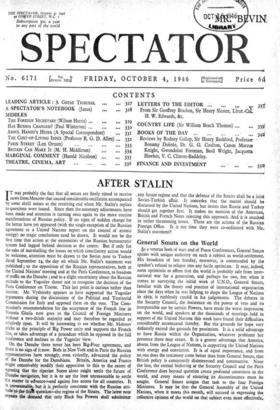AFTER STALIN
IT was probably the fact that all senses are finely tuned to receive news from Moscow that caused considerable oscillation accompanied by some shrill noises at the receiving end when Mr. Stalin's replies to questions were issued. Since then the necessary adjustments have been made and attention is turning once again to the more routine manifestations of Russian policy. If no signs of sudden change for the better have yet appeared (with the single exception of the Russian agreement to a United Nations report on the control of atomic energy) no tragic conclusions need be drawn. It would not be the first time that action at the extremities of the Russian bureaucratic system had lagged behind decision at the centre. But if only for the sake of marshalling the issues on which conciliatory action would be welcome, attention must be drawn to the Soviet note to Turkey dated September 24, the day on which Mr. Stalin's statement was published ; to the opposition of the Russian representatives, both at the United Nations' meeting and at the Paris Conference, to freedom of traffic on the Danube ; and to a slight uncertainty about the Russian attitude to the Yugoslav threat not to recognise the decision of the Paris Conference on Trieste. This last point is curious rather than sinister. Mr. Vyshinsky appears to have supported the Yugoslav arguments during the discussions of the Political and Territorial Commission for Italy and opposed them on the vote. The Com- mission's recommendation for the acceptance of the French line in Venezia Giulia now goes to the Council of Foreign Ministers without a two-thirds majority and may therefore be regarded as relatively open. It will be interesting to see whether Mr. Molotov sticks to the principle of Big Power unity and supports the French line, or takes advantage of a procedure which he opposed in the full °inference and inclines to the Yugoslav view.
On the Danube there never has been Big-Four agreement, and there is no sign of it now. Both in New York and in Paris the Russian representatives have strongly, even violently, advocated the policy of the Danube for the Danubians. Britain, America and France might- conceivably modify their opposition to this to the extent of agreeing that the riparian States alone might settle the future of Danube navigation, but it is to say the least unreasonable to settle the matter-in-advance----and against free access for all countries. It is unreasonable, but it is, perfectly consistent with the Russian atti- tude'to the- thiit question—the regime of the Straits. The latest note rePtats the demand that only Black Sea PoWers shall administer ..any future regime and that the defence of the Straits shall be a joint Soviet-Turkish affair. It concedes that the matter should be discussed by the United Nations, but insists that Russia and Turkey should get together first. It makes no mention of the American, British and French Notes rejecting this approach. And it is couched in rather threatening terms. These are the actions of the Russian Foreign Office. Is it not time they were co-ordinated with Mr., Stalin's statement?






























